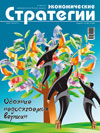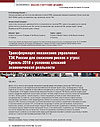Transformation of the Mechanisms for Managing the Fuel and Energy Complex (FEC) of Russia in Order to Reduce Risks and Threats: the Kremlin-2018 in a Complex Economic Reality
The purpose of the present article is to substantiate the directions of transforming the mechanisms of the fuel and energy complex management in Russia in order to eliminate risks and threats to the national economic interests of our country, manifested in the period of oil prices falling and introduction of anti-Russian economic and political sanctions. The authors propose approaches to substantiate the ways for protecting Russia’s economic interests in relation to the fuel and energy complex (FEC) of Russia, including concentration in the state’s hands of export flows of fuel and energy resources management (supply routes, volumes of extraction, transportation), cpecification of payment terms; intercorporate coordination of measures for development, reconstruction and modernization of fuel and energy infrastructure; formation of a qualitatively new infrastructure for wholesale and retail markets for fuel and energy resources (FER); transition to setting-up abroad the energynodal management mechanism regarding supply and transportation of Russian fuel and energy resources; clarification of measures for coordination and operation of profit centers, corporate financial centers, concentration centers of possession and management of property and financial assets in relation to large Russian energy corporations, including their subsidiaries and associates of the company abroad and others. Technology under consideration is proposed as an integral part of the management technologies of the Russian economy branches in relation to possible economic fluctuations of the world economy under conditions of significant changes related to new political realities in the USA, EU, etc.
References:
- Ageev A.I. Energetika i silovaya ekonomika: opyt ХХ veka i perspektivy [Energy and Power Economy: Experience of the XX Century and Prospects]. Energeticheskaya politika, 2015, no. 1, pp. 6–12.
- Ageev A.I., Gromov A.I. Kontseptsiya energetizma i ee primenenie v zadachakh ekonomicheskogo i energeticheskogo strategirovaniya [The Concept of Energy and Its Application in the Tasks of Economic and Energy Strategy Development]. Energeticheskaya politika, 2014, no. 5, pp. 12–20.
- Mikhaylov A.V., Chinaliev V.U., Shkuta A.A. i dr. Organizatsionno-ekonomicheskie mekhanizmy obespecheniya ekonomicheskoy bezopasnosti v TEK Rossii [Organizational-Economic Mechanisms for Providing Economic Safety in Fuel and Energy Complex of Russia]. Moscow, IPR RAN, 2017, 57 p.
- Abramov V.L., Ageev A.I., Kuzyk B.N. i dr. Neft’ Evrazii: formirovanie obshchego rynka EAES [Oil of Eurasia: Formation of the EAEU Common Market]. Moscow, Institut ekonomicheskikh strategiy, 2016, 404 p.
- Tsvetkov V.A. Pyat’ problem ekonomicheskoy bezopasnosti i ekonomicheskogo rosta v sovremennoy Rossii [Five Problems of Economic Security and Economic Growth in Modern Russia]. Vestnik Finansovogo universiteta, 2016, no. 2, pp. 6–15.
- Zoidov Z.K. Puti formirovaniya integrirovannoy rynochnoy infrastruktury i regulirovaniya proizvodstva i tovarooborota v ramkakh EAES [Ways of Forming Integrated Market Infrastructure and Production and Trade Regulation Within the EAEU Framework]. Moscow, IPR RAN, 2015, 141 p.
- Zoidov K.Kh., Medkov A.A., Zoidov Z.K. Razvitie tranzitnoy ekonomiki — osnova stabil’nosti, bezopasnosti i modernizatsii Rossii i stran Tsentral’noy Azii [Development of the Transit Economy — the Basis for Stability, Security and Modernization of Russia and the Central Asian Countries]. Moscow, TsEMI RAN, IPR RAN, 2016, 339 p.
- Chinaliev V.U. Upravlenie realizatsiey infrastrukturnykh proektov: koordinatsiya vypolneniya zakazov i postavok pri osushchestvlenii gosudarstvennykh i munitsipal’nykh zakupok [Managing Infrastructure Projects: Coordinating Implementation of Orders and Deliveries During Realization of State and Municipal Procurement]. Moscow, Finuniversitet, 2017, 76 p.
- Bortalevich V.Yu., Sorokin D.D. Korporativnoe upravlenie v usloviyakh vykhoda iz krizisa [Corporate Governance on the Way Out of Crisis]. Materialy mezhdunarodnoy nauchno-prakticheskoy konferentsii “Evraziyskaya ekonomicheskaya integratsiya kak faktor povysheniya stabil’nogo i postupatel’nogo razvitiya natsional’nykh khozyaystvennykh system” [Materials of the International Scientific and Practical Conference “Eurasian Economic Integration as a Factor for Enhancing Stable and Continuous Development of National Economic Systems”]. Moscow, 2016, September, 29–30. Moscow, TsEMI RAN / IPR RAN, 2016, pp. 35–36.
- Bortalevich S.I., Soldatov A.I., Soldatov A.A. Formirovanie i upravlenie v EAES integrirovannoy sistemoy toplivno-energeticheskoy infrastruktury [Forming and Managing the Integrated System of Fuel and Energy Infrastructure Within the EAEU]. Materialy mezhdunarodnoy nauchno-prakticheskoy konferentsii “25 let SNG: osnovnye itogi, problemy, perspektivy razvitiya” [Materials of the International Scientific-Practical Conference “25 Years of the CIS: the Main Results, Problems, Development Prospects”]. Moscow, IPT RAN, 2016, pp. 110, 111.
- Kommercheskoe pravo [Commercial Law]. Uchebnik dlya studentov vuzov, pod redaktsiey prof. M.M. Rassolova, prof. P.V. Aleksiya. 2-e izd. Moscow, YuNITI-DANA, Zakon i pravo, 2005, 383 p.
- Belyakov G.P. Problemy razvitiya energeticheskoy infrastruktury v regionakh s vysokoy stoimost’yu energoresursov [Problems of Energy Infrastructure Development in Regions with a High Cost of Energy Resources]. Moscow, Izdatel’stvo MPA-Press, 2013, 272 p.
- Dokholyan S.V., Petrosyants V.Z., Denevizyuk D.A. Primenenie metodov imitatsionnogo modelirovaniya v praktike upravleniya promyshlennymi predpriyatiyami [Applying Simulation Methods in the Practice of Industrial Enterprises Management]. Regional’nye problemy preobrazovaniya ekonomiki, 2014, no. 6 (44), pp. 67–74.
- Tsvetkov V. Vertikal’naya integratsiya [Vertical Integration]. Ekonomist, 2013, no. 3, p. 11.
- Loginov E.L. Informatsionnaya platforma, ob”edinyayushchaya telematicheskie, vychislitel’nye i informatsionnye servisy v EES Rossii [Information Platform Uniting Telematic, Computing and Information Services in the UES of Russia]. Nauchno-tekhnicheskaya informatsiya. Seriya 2: Informatsionnye protsessy i sistemy, 2013, no. 6, pp. 19–23.
- Raykov A.N., Ustinov A.V., Chikina A.G. Uskorenie dostizheniya soglasiya pri komandnom prinyatii resheniy v setevoy srede [Acceleration of Reaching an Agreement Under the Team Decision-Making in a Networked Environment]. Oboronnyy kompleks — nauchno-tekhnicheskomu progressu Rossii, 2015, no. 3 (127), pp. 3–9.
- Tanenbaum E., Van Steeen M. Raspredelennye sistemy. Printsipy i paradigm [Distributed Systems. Principles and Paradigms]. Saint Petersburg, Piter, 2003, 877 p.



